
Beer is one of the oldest and most widely consumed alcoholic drinks in the world, and the third most popular drink overall after water and tea. It is produced by the brewing and fermentation of starches, mainly derived from cereal grains—most commonly from malted barley, though wheat, maize (corn), rice, and oats are also used. During the brewing process, fermentation of the starch sugars in the wort produces ethanol and carbonation in the resulting beer. Most modern beer is brewed with hops, which add bitterness and other flavours and act as a natural preservative and stabilizing agent. Other flavouring agents such as gruit, herbs, or fruits may be included or used instead of hops. In commercial brewing, the natural carbonation effect is often removed during processing and replaced with forced carbonation.

Leffe is a premium beer brand owned by InBev Belgium, the European operating arm of the global Anheuser–Busch InBev brewery giant. There are several beers in the range, and they are marketed as Abbey beers. They are brewed in large quantities and are widely distributed.
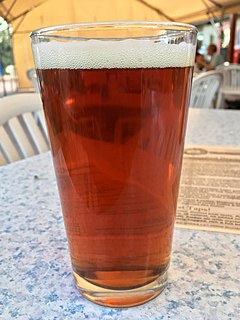
Pale ale is a typically golden to amber coloured style of ale which is brewed using an ale yeast and predominantly pale malt. The term first appeared around 1703 for beers made from malts dried with high-carbon coke, which resulted in a lighter colour than other beers popular at that time. Different brewing practices and hop quantities have resulted in a range of tastes and strengths within the pale ale family.

Belgian cuisine is widely varied with significant regional variations while also reflecting the cuisines of neighbouring France, Germany and the Netherlands. It is sometimes said that Belgian food is served in the quantity of German cuisine but with the quality of French food. Outside the country, Belgium is best known for its chocolate, waffles, fries and beer.

Sierra Nevada Brewing Co. was established in 1979 by homebrewers Ken Grossman and Paul Camusi in Chico, California, United States. The brewery produced 786,000 US bbl (922,000 hl) in 2010, and as of 2016, Sierra Nevada Brewing is the seventh-largest brewing company in the United States and is the third largest privately owned brewery in the United States.

Rochefort Brewery is a Belgian brewery which produces four beers designated as Trappist beers. The brewery is associated with the Rochefort Abbey, which originated in the thirteenth century. The current brewery dates from 1899.

Beer in Belgium varies from pale lager to amber ales, lambic beers, Flemish red ales, sour brown ales, strong ales and stouts. In 2018, there were approximately 304 active breweries in Belgium, including international companies, such as AB InBev, and traditional breweries including Trappist monasteries. On average, Belgians drink 68 liters of beer each year, down from around 200 each year in 1900. Most beers are bought or served in bottles, rather than cans, and almost every beer has its own branded, sometimes uniquely shaped, glass. In 2016, UNESCO inscribed Belgian beer culture on their list of the intangible cultural heritage of humanity.

Beer in the United States is manufactured by more than 7,000 breweries, which range in size from industry giants to brew pubs and microbreweries. The United States produced 196 million barrels (23.0 GL) of beer in 2012, and consumes roughly 28 US gallons (110 L) of beer per capita annually. In 2011, the United States was ranked fifteenth in the world in per capita consumption, while total consumption was second only to China.

American pale ale (APA) is a style of pale ale developed in the United States around 1980.
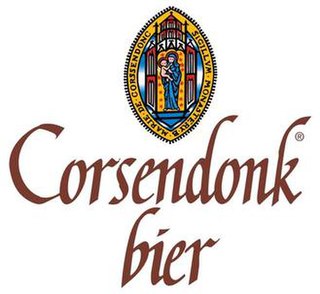
Corsendonk is a Belgian beer brand. The brandname refers to the Priory of Corsendonk in Oud-Turnhout; which was in operation from 1398 to 1784, and was rebuilt in 1968 as a hotel complex by new owners Corsendonk Hotels. In 1982, on the 125th anniversary of the Oud-Turnhout municipality, Jef Keersmaekers, grandson of Antonius Keersmaekers who had founded a brewery in 1906, was approached by the local tourist office to use the Corsendonk name for its abbey association, as an abbey beer marketing technique. He launched Pater Noster, now called Corsendonk Pater, and Agnus Dei, now called Corsendonk Agnus. As the family brewery had closed down in 1953, the beers were contracted out to other breweries, including Brasserie Du Bocq, who now brew all the brands. Other brands include Corsendonk Blond, Corsendonk Bruin and Corsendonk Christmas Ale.
Hoegaarden Brewery is a brewery in Hoegaarden, Belgium, and the producer of a wheat beer.
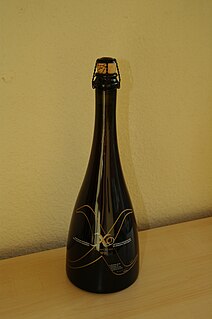
La Binchoise is a beer brewery in Binche, Belgium. The brewery was founded in 1986 by husband and wife Graux-Jauson, unemployed at the time. They set up their business at home, but soon moved to the building of an old malthouse and quickly achieved commercial success, gaining a gold medal at the annual beer festival in Chicago. For a while their beer was made in a cauldron formerly owned by the Belgian National Guard. Their beers are refermented in the bottle.

De Proefbrouwerij is a Flemish brewery founded in 1996 by Dirk Naudts and his wife Saskia Waerniers. The brewery is located in the village of Lochristi, near Ghent. They operate as a rental brewery, creating beers for third party brewers, as well as producing their own beers. They also operate a research and development department focused on the science of brewing.

Bloemenbier is a Belgian beer brewed with flowers.
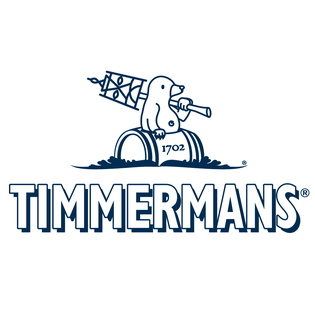
Brouwerij Timmermans is a lambic brewery in Itterbeek, Belgium, founded in 1702.
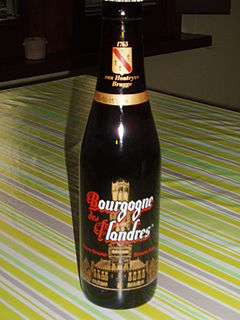
Bourgogne des Flandres is a Belgian beer brewed by Timmermans Brewery in Itterbeek in the municipality of Dilbeek which is located in Flemish Brabant.
The Aarschotse Stadsbrouwerij, located in the city of Aarschot, Belgium, is an initiative of the city's governing body in collaboration with local brewing-enthusiasts.

Belgian beer culture includes traditions of craftsmanship for brewing beer and is part of the diet and social life of Belgians. Its cultural value was formally recognised in 2016 when it was added to UNESCO's "Intangible Cultural Heritage of Humanity" list.
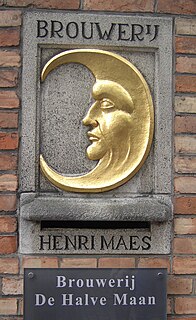
De Halve Maan is a beer brewery in Bruges, Belgium. De Halve Maan brews Brugse Zot, Straffe Hendrik, Blanche de Bruges/Brugs Tarwebier and other beers. The Straffe Hendrik and Blanche de Bruges/Brugs Tarwebier brands had been sold to other breweries, but De Halve Maan has recently bought them back and is returning production to Bruges.
Herkenrode is a Belgian abbey beer brewed by the Cornelissen Brewery at Opitter in Bree, Limburg, named after the former Herkenrode Abbey in Hasselt.

















